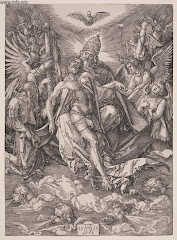Presence of God The Sacraments
Holy Communion
Holy Communion
- In our relationship with God, He is the one who acts. We do not seek Him: He seeks us. We do not love God: He loves us. (1 John 4:10)
- This action is OBJECTIVE. God comes to us from the outside. Though it is true that Christ and the Holy Spirit come to dwell in our hearts, they are not a mere function of our psychological state, our experiences, or our inward selves.
- Look to something OBJECTIVE and tangible: to the cross, to God's Word, to the immutable promises of God.
- Christianity has always affirmed the religious significance of the physical.
- The means of grace through which the Holy Spirit works on us to create faith and spiritual growth are evangelical. That is, they bear the Gospel of forgiveness through Christ.
- In the sacrament of Holy Communion, all of Lutheran spirituality is crystallized: God acts, objectively, through matter, embodying the Gospel and promising the forgiveness of sin. And, more than that -- or rather, making all of these efficacious --- is the real presence of Jesus Christ. This another astonishing claim, one which many Christians draw back from, but one that is at the pulsing heart of Lutheran evangelicalism.
- The Lutherans' exceedingly high view of the sacraments derives directly from their exceedingly high view of God's Word.
- The Lord's Supper is nothing less than the Gospel.
- God routinely feeds His people, with their daily bread and with Himself. It is His actions, and even our blindness or dull insensibility does not take anything away from His gifts.
- Without food, we would starve to death.
- The Gospel of Christ converts us, but it also nourishes us.


